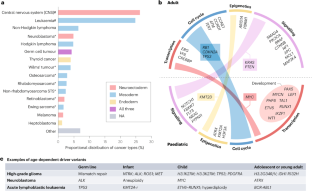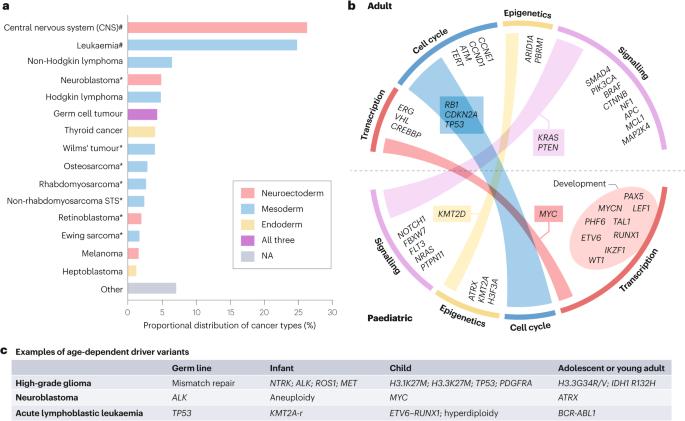发育起源决定儿科癌症基因组
IF 72.5
1区 医学
Q1 ONCOLOGY
引用次数: 0
摘要
在过去二十年里,技术的进步使人们对儿科癌症基因组有了前所未有的了解,揭示了与成人癌症不同的特征。儿科癌症起源于发育中的组织,一般突变负荷较低,由破坏转录活性、染色质状态、非编码顺式调控区和其他生物功能的变异驱动。每种肿瘤内都有多个状态各异的细胞群,其中一些细胞群的血统可追溯到胎儿时期。全基因组遗传筛选发现了儿童癌症中与起源细胞和转录失调相关的薄弱环节,这些薄弱环节已成为设计新治疗方法(包括小分子药物、免疫疗法和靶向蛋白降解)的宝贵资源。在本综述中,我们将从泛癌症的角度介绍有关儿童癌症这些方面的最新发现,并对未来的研究进行展望。本文章由计算机程序翻译,如有差异,请以英文原文为准。


Developmental origins shape the paediatric cancer genome
In the past two decades, technological advances have brought unprecedented insights into the paediatric cancer genome revealing characteristics distinct from those of adult cancer. Originating from developing tissues, paediatric cancers generally have low mutation burden and are driven by variants that disrupt the transcriptional activity, chromatin state, non-coding cis-regulatory regions and other biological functions. Within each tumour, there are multiple populations of cells with varying states, and the lineages of some can be tracked to their fetal origins. Genome-wide genetic screening has identified vulnerabilities associated with both the cell of origin and transcription deregulation in paediatric cancer, which have become a valuable resource for designing new therapeutic approaches including those for small molecules, immunotherapy and targeted protein degradation. In this Review, we present recent findings on these facets of paediatric cancer from a pan-cancer perspective and provide an outlook on future investigations. In this Review, Zhang and colleagues provide an overview of the molecular characteristics of paediatric cancer and highlight how these malignancies arise from developmental aberrations resulting in paediatric-specific cancer genomes that influence both the initiation and progression of cancer. Additionally, they discuss genetic vulnerabilities within these cancer genomes that present opportunities for therapeutic interventions.
求助全文
通过发布文献求助,成功后即可免费获取论文全文。
去求助
来源期刊

Nature Reviews Cancer
医学-肿瘤学
CiteScore
111.90
自引率
0.40%
发文量
97
审稿时长
6-12 weeks
期刊介绍:
Nature Reviews Cancer, a part of the Nature Reviews portfolio of journals, aims to be the premier source of reviews and commentaries for the scientific communities it serves. The correct abbreviation for abstracting and indexing purposes is Nat. Rev. Cancer. The international standard serial numbers (ISSN) for Nature Reviews Cancer are 1474-175X (print) and 1474-1768 (online). Unlike other journals, Nature Reviews Cancer does not have an external editorial board. Instead, all editorial decisions are made by a team of full-time professional editors who are PhD-level scientists. The journal publishes Research Highlights, Comments, Reviews, and Perspectives relevant to cancer researchers, ensuring that the articles reach the widest possible audience due to their broad scope.
 求助内容:
求助内容: 应助结果提醒方式:
应助结果提醒方式:


